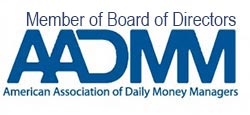It’s difficult to see aging parents lose their ability to handle tasks they used to do easily. While you may want to help, they may not be ready to admit they need assistance. However, allowing things to continue as is can have serious consequences, especially if the tasks involve money. If you think your parents are having problems managing their finances, there are steps you can take to address the issue with them.
Communicate early and often
A common issue in families is that no one wants to talk about money until it becomes a problem. At that point, everyone is stressed and conflicts are more likely to occur. Discussing finances long before they are a concern encourages parents and children to plan appropriately for the future. Continuing to have conversations regularly also minimizes the risk that adult children will suddenly be surprised by their parents’ financial situation – whether it’s that they are running out of money, they need long-term care, or they can no longer manage their day-to-day finances for health reasons.
Ask specific questions
Vague discussions about whether parents are doing okay financially are not helpful. Ask parents:
- What are their assets and debts?
- How much income do they have?
- What are their expenses?
- Have they done any long-term care planning?
- What are their wishes regarding who should handle their finances if they cannot do so?
- Do they have necessary legal documents in place (i.e., will, healthcare proxy, living will, power of attorney, and possibly a trust)?
- Who are their advisors (lawyer, financial advisor, accountant)?
- Where do they keep their accounts and how can they be accessed if something happens to them?
- Do they have a ‘just-in-case’ box that contains essential information needed by family members if they die or become incapacitated?
Both parents and children need to understand whether parents have enough money to last for the rest of their lives and plan accordingly.
Look for signs of trouble
Unfortunately, parents may not volunteer that they are having problems managing their money or they may not realize it because of cognitive issues. Adult children should regularly ask questions and pay attention to potential red flags. These include piles of bills and financial paperwork lying around, late payment notices, utilities shut off, increased or unusual purchasing, writing checks to unknown individuals, companies, or charities, and other signs.
Work together on managing finances
Parents may struggle with bills and paperwork, but that doesn’t necessarily mean they have to hand over all management of their day-to-day finances. One option is to handle tasks jointly. Bills can be put on autopay to the extent possible to minimize missed payments. Children can also review monthly bank and credit card statements or gain online access to accounts to verify the accuracy of payments their parents are making and ensure they are legitimate expenses.
Explain the consequences of financial mistakes
Failing to pay bills can damage parents’ credit and result in them being sued, having their utilities cut off, losing insurance coverage, and even losing their home.
Confusion about money may also make it more likely they will overspend or fall victim to scams and could lose substantial money and/or end up in serious debt. Importantly, this affects both spouses, so one spouse cannot afford to ignore what the other one is doing because they both will suffer financially.
Even if parents are fully capable of managing their money, a crisis can happen such as an accident or prolonged hospital stay that prevents them from paying bills or addressing other tasks. They must have a backup person who can take on these responsibilities on a temporary or permanent basis as needed.
Bring in a neutral third-party
A neutral third party, like a daily money manager, serves multiple purposes. First, the individual can help educate parents about the importance of addressing these financial issues and offer suggestions about how parents and children may work together.
Second, parents can delegate any or all financial tasks to a neutral daily money manager. This can address a parent’s concerns about trusting their child or avoid potential family conflicts when choosing one child over another to manage money.
Parents can also decide who has access to information about their finances. The daily money manager can only share information with authorized individuals, so parents can maintain their privacy if they have concerns. If they want information to go to their children, the daily money manager will provide them with monthly detailed reports of all payments and other work.
It’s not easy for anyone to give up control over tasks they used to handle but sometimes it is necessary. If you are in this situation, as a parent or child, contact us for a free consultation.




